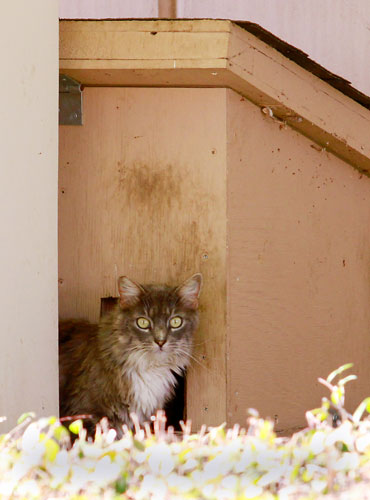Many Bakersfield College students have not heard of the Campus Cat Coalition. The Campus Cat Coalition is designed to help decrease the population of feral cats around college and university campuses. Bakersfield College is a part of this organization.
At BC, there are over 70 members, some of them are professors and others are community members.
Carol Paschal, library technician at BC, is also a part of this organization. She has been trying to take care of the population of feral cats at BC since 2002.
Through the Campus Cat Coalition and the Trap-Neuter-Release Program, many feral cats are trapped, neutered, and released back into where they were picked up. This is to decrease the population of feral cats by keeping them from reproducing.
Even though the population at BC has been decreasing, the way that it’s been happening is not necessarily favorable. Over the years, there have been some dogs from the neighborhoods around BC that have been coming into the campus at night and have been attacking and killing feral cats.
“I was afraid to come to campus for fear of what I could find,” said Paschal.
Cat issues are happening on almost all campuses. Some have feral cats because there are dorms, and some, like BC, because of the close neighborhoods that surround the campus.
There are many myths about cats on campus, and Paschal feels that these get in the way of helping these animals. For example, the myth that if a cat is fed it will always stay.
“By nature, cats are attracted to areas where people gather,” said Paschal.
Whether they are fed or not, they will stay around. Even if they are not being fed, cats stay and begin to try to feed themselves.
“If we don’t feed cats, they will find food in trash cans, and dumpsters and resort to killing birds for food,” said Paschal.
By sterilizing these cats and feeding them, this organization will be able to help reduce the population of cats around campus. One of the goals of this group is to help these cats find a home.
One particular myth that impedes with finding a home for the many cats at BC, is the myth that feral cats carry diseases that put people and other cats at risk.
“Studies have shown that the rate of these diseases among managed feral cat colonies is no higher than among domestic pets,” according to an article in the American Veterinary Medical Association.
Paschal hopes that people will become aware of these myths and know that they are not true and that more people will be willing to help find these cats homes.
Even though this organization exists, Paschal hopes that it does not encourage people to drop off unwanted animals around the BC campus.
“Not only it is illegal, but their chance of survival is very small,” said Paschal.
She does hope that in the future more people will want to become involved with this organization.
“Maybe students would like to become involved and form a club,” said Paschal.


